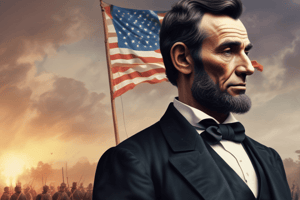Podcast
Questions and Answers
What was a significant outcome of the Civil War in relation to slavery?
What was a significant outcome of the Civil War in relation to slavery?
- The ratification of the 13th Amendment (correct)
- The establishment of the Confederate States of America
- The assassination of Abraham Lincoln
- The expansion of slavery into new territories
Which political party was predominantly anti-slavery during Lincoln's presidency?
Which political party was predominantly anti-slavery during Lincoln's presidency?
- Republican Party (correct)
- Libertarian Party
- Whig Party
- Democratic Party
What was required of wealthy Southerners for them to regain political rights according to Andrew Johnson's Plan?
What was required of wealthy Southerners for them to regain political rights according to Andrew Johnson's Plan?
- They needed to take a loyalty oath (correct)
- They must form a new state constitution
- They had to support the Radical Republicans
- They had to enact new voting laws
What aspect of Johnson's approach to Reconstruction distinguished him from Lincoln?
What aspect of Johnson's approach to Reconstruction distinguished him from Lincoln?
Which of the following statements reflects the intent of Black Codes?
Which of the following statements reflects the intent of Black Codes?
What did the Black Codes prohibit concerning newly freed slaves and their interactions with white individuals?
What did the Black Codes prohibit concerning newly freed slaves and their interactions with white individuals?
Who was the Confederate Vice-President that was sent to Congress by Southern states?
Who was the Confederate Vice-President that was sent to Congress by Southern states?
What was necessary for Southern States to do to return to the Union during Reconstruction?
What was necessary for Southern States to do to return to the Union during Reconstruction?
What was a consequence for individuals who did not adhere to curfews during the period of vagrancy laws?
What was a consequence for individuals who did not adhere to curfews during the period of vagrancy laws?
What did the Civil Rights Bill of 1866 aim to address?
What did the Civil Rights Bill of 1866 aim to address?
What was one of the primary functions of the Freedmen's Bureau during Reconstruction?
What was one of the primary functions of the Freedmen's Bureau during Reconstruction?
Which amendment turned the Civil Rights Bill into a constitutional amendment?
Which amendment turned the Civil Rights Bill into a constitutional amendment?
What triggered the impeachment of President Johnson?
What triggered the impeachment of President Johnson?
What was required of Southern states for re-admission to the Union during Reconstruction?
What was required of Southern states for re-admission to the Union during Reconstruction?
How close was President Johnson to being removed from office during his impeachment trial?
How close was President Johnson to being removed from office during his impeachment trial?
Which of the following amendments granted black men the right to vote?
Which of the following amendments granted black men the right to vote?
Flashcards
What was the primary cause of the Civil War?
What was the primary cause of the Civil War?
The main cause of the Civil War, the institution of slavery became a central issue in 1860 with the election of Abraham Lincoln, a Republican.
What were the Republican Party's views on slavery?
What were the Republican Party's views on slavery?
The Republican Party had a range of views on slavery, with the most vocal section advocating against it.
What were the Democratic Party's views on slavery?
What were the Democratic Party's views on slavery?
The Democratic Party's stance on slavery varied widely, from indifference to open support.
What was Lincoln's stance on slavery during his campaign?
What was Lincoln's stance on slavery during his campaign?
Signup and view all the flashcards
What happened after Lincoln's election?
What happened after Lincoln's election?
Signup and view all the flashcards
When did the Civil War take place?
When did the Civil War take place?
Signup and view all the flashcards
What was Reconstruction?
What was Reconstruction?
Signup and view all the flashcards
What was President Johnson's approach to Reconstruction?
What was President Johnson's approach to Reconstruction?
Signup and view all the flashcards
What were the terms of Johnson's Reconstruction plan?
What were the terms of Johnson's Reconstruction plan?
Signup and view all the flashcards
What was Johnson's approach to pardoning Southerners?
What was Johnson's approach to pardoning Southerners?
Signup and view all the flashcards
What were Black Codes ?
What were Black Codes ?
Signup and view all the flashcards
What was the Civil Rights Bill of 1866?
What was the Civil Rights Bill of 1866?
Signup and view all the flashcards
What was the Freedmen's Bureau?
What was the Freedmen's Bureau?
Signup and view all the flashcards
What were the Military Reconstruction Acts?
What were the Military Reconstruction Acts?
Signup and view all the flashcards
What was the 14th Amendment?
What was the 14th Amendment?
Signup and view all the flashcards
What was the 15th Amendment?
What was the 15th Amendment?
Signup and view all the flashcards
Study Notes
The Civil War (1861-1865)
- The primary cause of the Civil War was slavery.
- The issue of slavery became central in 1860 with the election of Abraham Lincoln, a Republican, as president.
- Lincoln defeated John Breckinridge, a Democrat.
- The Republican Party had varying views on slavery, with the Radical Republicans being the most vocal advocates against it.
- The Democratic Party had a mix of stances, ranging from indifference to support for slavery.
- Lincoln campaigned on limiting the expansion of slavery to new territories.
- Following Lincoln's election, 11 Southern states seceded from the Union to form the Confederate States of America.
- The Civil War began on April 12, 1861, and ended on April 9, 1865.
- President Lincoln was assassinated on April 14, 1865.
Lincoln's Reconstruction Efforts
- Presided over the passing of the 13th Amendment, which abolished slavery in the United States.
- Advocated for freed African-American men to have the right to vote.
Reconstruction: A Definition
- The period after the Civil War, from 1865 to 1877, focused on rebuilding the nation and determining the status of formerly enslaved people.
- Key issues included:
- Reintegrating the Southern states into the Union.
- Establishing the legal and political rights of African Americans.
- Providing assistance to the newly freed population.
Presidential Reconstruction (1865-1867)
- Andrew Johnson, Lincoln's successor, took a lenient approach to Reconstruction.
- Both Johnson and Lincoln were pro-Union but Johnson was not anti-slavery and lacked sympathy for freed slaves.
- To rejoin the Union, Southern states had to:
- Take a loyalty oath.
- Ratify the 13th Amendment.
Johnson's Plan
- Wealthy Southerners seeking political or property rights had to obtain a personal pardon from Johnson.
- Johnson favored a quick return of Southern states to the Union without rigorous conditions.
- The plan allowed Southern states to elect former Confederate officials to Congress, including 9 congressmen, 7 state officials, 4 generals, 4 colonels, and Alexander Stephens, the Confederate Vice-President, back into government roles.
Black Codes
- These were laws passed in Southern states, distinct from Jim Crow Laws, to limit the rights of newly freed African Americans.
- The Black Codes varied between states and included restrictions such as:
- Prohibiting African Americans from testifying against white people in court.
- Limiting voting rights.
- Requiring permission from white people for travel.
- Allowing for the assignment of children to former owners.
- Arresting African Americans for vagrancy (being unemployed).
- Establishing curfews for African Americans.
- Allowing for the auctioning off of people who didn't pay fines to work for white employers.
The Break Between Johnson and Congress
- The passing of the Civil Rights Bill of 1866 was a direct response to the Black Codes.
- Johnson vetoed the bill, but Congress overturned it.
Congressional Reconstruction (1867-1870)
- Congress took a more active role in Reconstruction, with the establishment of the Freedmen's Bureau - a federal agency designed to help freed slaves transition to freedom.
- The Bureau focused on:
- Building schools.
- Assisting with employment.
- Providing medical aide.
Military Reconstruction Acts
- Passed in 1867, the Acts divided the South into five military districts, under the control of federal troops.
- The Acts outlined the requirements for Southern states re-admission to the Union, including:
- Crafting new state constitutions guaranteeing black men the right to vote.
- Ratifying the 14th Amendment.
14th and 15th Amendments
- The 14th Amendment, passed in 1868, formally made the Civil Rights Bill into a constitutional amendment.
- The 15th Amendment, passed in 1870, granted the right to vote to African-American men.
Impeachment of Andrew Johnson
- Johnson attempted to dismiss federal officials who were working on Reconstruction efforts, violating the Tenure in Office Act, a law passed by Congress.
- Johnson argued the law was unconstitutional and fired the Secretary of War, a prominent ally of the Radical Republicans.
- Congress impeached Johnson, accusing him of 'high crimes and misdemeanors'.
- The House of Representatives voted to approve the articles of impeachment, and the Senate held a trial.
- Although the Senate narrowly failed to convict Johnson by one vote, he was unable to run for office again in 1868.
- Ulysses S. Grant was elected president.
Studying That Suits You
Use AI to generate personalized quizzes and flashcards to suit your learning preferences.




